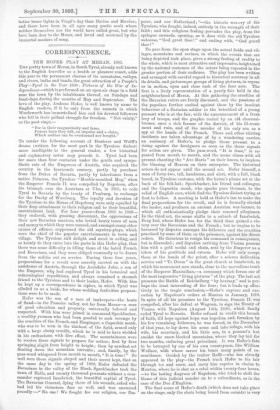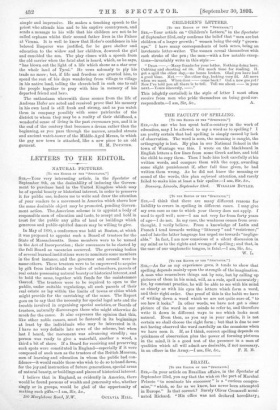CORRESPONDENCE.
THE HOFER PLAY AT MERAN, 1893.
TEE pretty town of Meran, in South Tyrol, already well known to the English traveller as a health or pleasure resort, adds this year to the permanent charms of its mountains, valleys, and rivers, baths and bands, the great attraction of a People's Play—Tyrol in the Year 1809: Pictures of the War of In- (Zependence—which is performed on an open-air stage in a field near the town by the inhabitants thereof, on Sundays and feast-days during the months of May and September. The hero of the play, Andreas Hofer, is well known by name to English readers, if it be only from the sonnets in which Wordsworth has immortalised him and his devoted followers who fell in their gallant struggle for freedom. "Not vainly," as the poet sings,— " For in their magnanimity and fame, Powers have they left, an impulse and a claim, Which neither can be overturned nor bought."
To render the following account of Husterer and Wolff's drama (written for the most part in the Tyrolese dialect) more intelligible to the general reader, a few historical .and explanatory notes may precede it. Tyrol had been for more than four centuries under the gentle and sympa- thetic rule of the Emperors of Austria, who acquired the country in the fourteenth century, partly by purchase from the Dukes of Bavaria, partly by inheritance from a native Princess, the Tyrolese " Muckle-mouthed Meg," when the Emperor Francis II. was compelled by Napoleon, after his triumph over the Austrians at Ulm, in 1805, to cede Tyrol to Bavaria by the treaty of Presburg, in exchange for the Duchy of Wurzburg. The loyalty and devotion of the Tyrolese to the House of Hapsburg were only equalled by their deep attachment to their religion and to their beautiful, mountainous land. For four years—from 1805 to 1809— they endured, with growing discontent, the oppressions of their new Bavarian masters, who levied heavy taxes of men and money to which they were unused, and amongst many other causes of offence, suppressed the old mystery-plays, which were the chief of the popular entertainments in town and village. The Tyrolese still delight and excel in acting, and so keenly do they enter into the parts in this Hofer play, that there was some difficulty in filling those of the hated French and Bavarians, and they were obliged eventually to be drawn from the militia out on service. During these four years, preparations for a revolt were secretly carried on with the assistance of Austria, through the Archduke John, a son of the Emperor, whq had explored Tyrol in his botanical and mineralogical expeditions, and always remained a staunch friend to the Tyrolese and to their leader, Hofer. With him he kept up a correspondence in cipher, in which Tyrol was alluded to as a bride, for whose wedding festivities prepara- tions were to be made.
Hofer was the son of a race of innkeepers—the hosts of Sand—in the Passeier valley, not far from Meran—a man of good education and property, universally beloved and respected. With him were joined in command Speckbacher, a wealthy yeoman who had been goaded to seek revenge by the cruelties of the French, and Haspinger, a Capuchin monk, who was to be seen in the thickest of the fight, armed only with a large ebony crucifix, which he is said to have wielded in his enthusiasm with dire effect. The mountaineers were to receive three signals to prepare for action ; first by fires springing alight from height to height; then by sawdust set floating down the mountain torrents ; and, finally, by the pass-word whispered from mouth to mouth, "It is time !" So well were these signals obeyed and their secret kept, that on the same day in the spring of 1809, Hofer defeated the Bavarians in the valley of the Eisak, Speckbaoher took the town of Halle, and twenty thousand peasants without a com- mander captured Innsbruck, the beautiful capital of Tyrol. The Bavarian General, dying there of his wounds, asked who had led his victorious foes so well, and was answered proudly :—" No one ! We fought for our religion, our Em- peror, and our Fatherland ; "—the historic war-cry of the Tyrolese, who fought, indeed, entirely in the strength of their faith; and this religious feeling pervades the play, from the epilogue onwards, opening, as it does with the old Tyrolese welcome, "God greet thee!" and ending with, "God guard thee !"
To gaze from the open stage upon the actual fields and vil- lages, mountains and ravines, in which the events that are being depicted took place, gives a strong feeling of reality to the whole, which is most attractive and impressive, heightened by the national costumes of the motors being repeated in the greater portion of their audience. The play has been written and arranged with careful regard to historical accuracy in all its details, and picturesque groups of living pictures, in repose or in motion, open and close each of the four acts. The first is a lively representation of a yearly fair held in the neighbourhood of Meran. At this gathering the cruelties of the Bavarian rulers are freely discussed, and the passions of the populace further excited against them by the insolent behaviour of a Bavarian soldier to the betrothed of a young peasant who is at the fair, with the announcement of a fresh levy of troops, and the graphic recital by an old charcoal- burner, once a rich farmer of the district, of his ill-treat- ment and ruin, and of the murder of his only son as a spy at the hands of the French. These and other stirring incidents are taken advantage of by a wandering carrier, an emissary of Hofer's, to pledge those present to a rising against the foreigners as soon as the three signals for action are given. The pass-word, "It is time," is re- peated from mouth to mouth, and the scene closes with all present chanting the "Ave Maria" on their knees, to implore the blessing of Heaven on their enterprise. The historical actors do not appear until the second act. Hofer himself, a man of forty-two, tall, handsome, and alert, with a full, black beard, in Tyrolese costume, with the heron's plume set at the back of his felt-hat ; Speckbacher, his friend and colleague, and the Capuchin monk, who speaks pure German, to the relief of English ears, which find the Tyrolese dialect trying at first to follow. A meeting is held at Hofer's inn to make the final preparations for the revolt, and he is formally elected the leader, and produces an ancient Austrian war-banner, to which all enthusiastically pledge their renewed allegiance. In the third act, the scene shifts to a suburb of Innsbruck, Berg Isel, where Hofer has for the third time gained a vic- tory over the Bavarians and the French ; but he begins to be harassed by disputes amongst his followers and the cruelties practised by some of them on the prisoners, against his direct orders. He threatens to resign his command in consequence, but is dissuaded ; and deputies arriving from Vienna present him with a gold medal and chain, sent by the Emperor as a token of his gratitude and esteem. Hofer will only accept them at the hands of the priest, after a solemn dedication service and " Te Deum" in the great church at Innsbruck, in which his monument now stands, close to the marvellous tomb of the Emperor Maximilian,—a ceremony which forms one of the most impressive "living pictures "of the play. The last act presents the Battle of Reichelberg "by hearsay," and is per- haps the least interesting ol the four; but it leads up effec- tively to the tragic conclusion,—Hofer's capture and exe- cution by Napoleon's orders at Mantua in January, 1810. In spite of all his promises to the Tyrolese, Francis II. was compelled, after his defeat at Wagram, to sign the Treaty of Vienna with Napoleon (August 14th, 1809), which finally ceded Tyrol to Bavaria. Hofer refused to credit this breach of faith, till hope against hope was hopeless, and, forsaken by his few remaining followers, he was forced, in the December of that year, to lay down his arms and take refuge, with his wife, his secretary, and his little son, in a peasant's hut amidst the snow-blocked mountains, where they lay hid for two months, enduring great privations. It was Hofer's fate to be betrayed by one of his own countrymen, like William Wallace, with whose career his bears many points of re- semblance. Guided by the traitor Refill—who has already appeared in the play—the French track Hofer to his lair i through ice and snow, and carry him captive n chains to Mantua, where he is shot as a rebel within twenty-four hours, —to the lasting disgrace of Napoleon, who tried to shift the blame of this judicial murder on to a subordinate, as in the case of the Due d'Enghien.
The final scene of Hofer's death (which does not take place on the stage, only the shots being heard from outside) is very simple and impressive, lie makes a touching speech to the priest who attends him and to his captive countrymen, and sends a message to his wife that his children are not to be called orphans whilst their second father lives in the Palace at Vienna. It is well to know that Hofer's confidence in his beloved Emperor was justified, for he gave shelter and education to the widow and her children, dowered the girl and ennobled the son. The play closes with a speech from the old carrier when the fatal shot is heard, which, as he says, "has blown out the light of a life which shone as a star over the whole land of Tyrol." He vows solemnly to ply his trade no more ; but, if life and freedom are granted him, to spend the rest of his days wandering from village to village in his native land, tolling the church-bell in each one to call the people together to pray with him in memory of his departed friend and hero.
The enthusiasm wherewith these scenes from the life of Andreas Hofer are acted and received prove that his memory in his own land is still fresh and strong, and as you watch them in company possibly with some patriarchs of the district to whom they may be a reality of their childhood, a wonderful sense of living in the past overcomes you, and it is the end of the century that becomes a dream rather than the beginning, as you pass through the narrow, arcaded streets and ancient watch-tower of the Middle-Aged Kerma, to which the gay new town is attached, like a new piece to an old



































 Previous page
Previous page